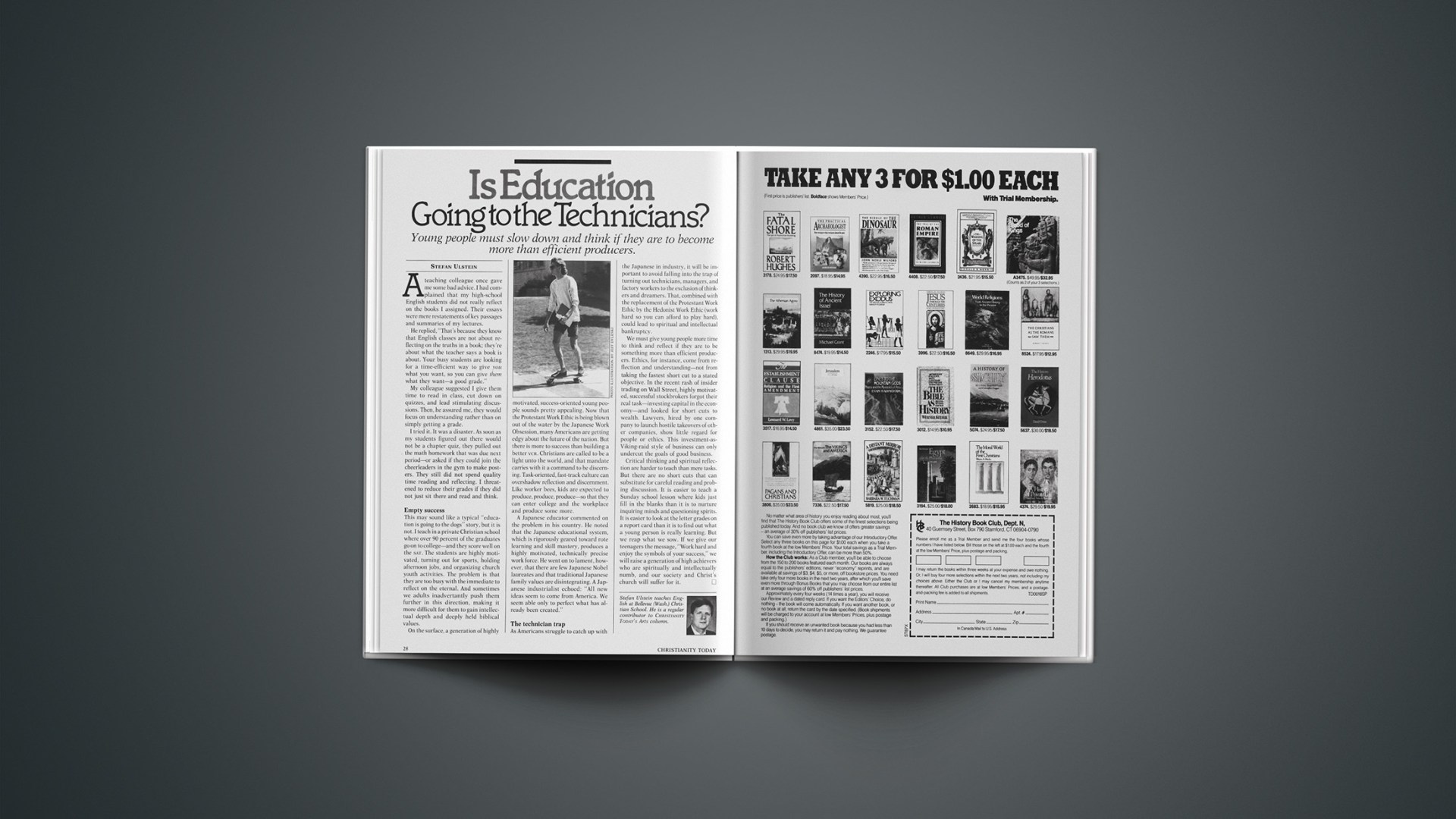A teaching colleague once gave me some bad advice. I had complained that my high-school English students did not really reflect on the books I assigned. Their essays were mere restatements of key passages and summaries of my lectures.
He replied, “That’s because they know that English classes are not about reflecting on the truths in a book; they’re about what the teacher says a book is about. Your busy students are looking for a time-efficient way to give you what you want, so you can give them what they want—a good grade.”
My colleague suggested I give them time to read in class, cut down on quizzes, and lead stimulating discussions. Then, he assured me, they would focus on understanding rather than on simply getting a grade.
I tried it. It was a disaster. As soon as my students figured out there would not be a chapter quiz, they pulled out the math homework that was due next period—or asked if they could join the cheerleaders in the gym to make posters. They still did not spend quality time reading and reflecting. I threatened to reduce their grades if they did not just sit there and read and think.
Empty Success
This may sound like a typical “education is going to the dogs” story, but it is not. I teach in a private Christian school where over 90 percent of the graduates go on to college—and they score well on the SAT. The students are highly motivated, turning out for sports, holding afternoon jobs, and organizing church youth activities. The problem is that they are too busy with the immediate to reflect on the eternal. And sometimes we adults inadvertantly push them further in this direction, making it more difficult for them to gain intellectual depth and deeply held biblical values.
On the surface, a generation of highly motivated, success-oriented young people sounds pretty appealing. Now that the Protestant Work Ethic is being blown out of the water by the Japanese Work Obsession, many Americans are getting edgy about the future of the nation. But there is more to success than building a better VCR. Christians are called to be a light unto the world, and that mandate carries with it a command to be discerning. Task-oriented, fast-track culture can overshadow reflection and discernment. Like worker bees, kids are expected to produce, produce, produce—so that they can enter college and the workplace and produce some more.
A Japanese educator commented on the problem in his country. He noted that the Japanese educational system, which is rigorously geared toward rote learning and skill mastery, produces a highly motivated, technically precise work force. He went on to lament, however, that there are few Japanese Nobel laureates and that traditional Japanese family values are disintegrating. A Japanese industrialist echoed: “All new ideas seem to come from America. We seem able only to perfect what has already been created.”
The Technician Trap
As Americans struggle to catch up with the Japanese in industry, it will be important to avoid falling into the trap of turning out technicians, managers, and factory workers to the exclusion of thinkers and dreamers. That, combined with the replacement of the Protestant Work Ethic by the Hedonist Work Ethic (work hard so you can afford to play hard), could lead to spiritual and intellectual bankruptcy.
We must give young people more time to think and reflect if they are to be something more than efficient producers. Ethics, for instance, come from reflection and understanding—not from taking the fastest short cut to a stated objective. In the recent rash of insider trading on Wall Street, highly motivated, successful stockbrokers forgot their real task—investing capital in the economy—and looked for short cuts to wealth. Lawyers, hired by one company to launch hostile takeovers of other companies, show little regard for people or ethics. This investment-as-Viking-raid style of business can only undercut the goals of good business.
Critical thinking and spiritual reflection are harder to teach than mere tasks. But there are no short cuts that can substitute for careful reading and probing discussion. It is easier to teach a Sunday school lesson where kids just fill in the blanks than it is to nurture inquiring minds and questioning spirits. It is easier to look at the letter grades on a report card than it is to find out what a young person is really learning. But we reap what we sow. If we give our teenagers the message, “Work hard and enjoy the symbols of your success,” we will raise a generation of high achievers who are spiritually and intellectually numb, and our society and Christ’s church will suffer for it.
Stefan Ulstein teaches English at Bellevue (Wash.) Christian School. He is a regular contributor to Christianity Today’s Arts column.









